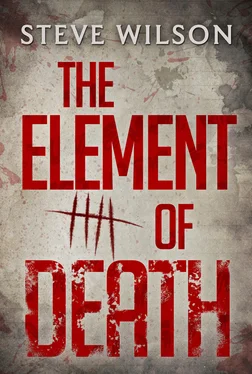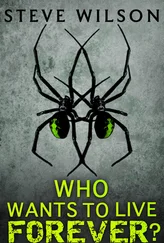Steve Wilson - The Element Of Death
Здесь есть возможность читать онлайн «Steve Wilson - The Element Of Death» — ознакомительный отрывок электронной книги совершенно бесплатно, а после прочтения отрывка купить полную версию. В некоторых случаях можно слушать аудио, скачать через торрент в формате fb2 и присутствует краткое содержание. Жанр: unrecognised, на английском языке. Описание произведения, (предисловие) а так же отзывы посетителей доступны на портале библиотеки ЛибКат.
- Название:The Element Of Death
- Автор:
- Жанр:
- Год:неизвестен
- ISBN:нет данных
- Рейтинг книги:4 / 5. Голосов: 1
-
Избранное:Добавить в избранное
- Отзывы:
-
Ваша оценка:
- 80
- 1
- 2
- 3
- 4
- 5
The Element Of Death: краткое содержание, описание и аннотация
Предлагаем к чтению аннотацию, описание, краткое содержание или предисловие (зависит от того, что написал сам автор книги «The Element Of Death»). Если вы не нашли необходимую информацию о книге — напишите в комментариях, мы постараемся отыскать её.
The Element Of Death — читать онлайн ознакомительный отрывок
Ниже представлен текст книги, разбитый по страницам. Система сохранения места последней прочитанной страницы, позволяет с удобством читать онлайн бесплатно книгу «The Element Of Death», без необходимости каждый раз заново искать на чём Вы остановились. Поставьте закладку, и сможете в любой момент перейти на страницу, на которой закончили чтение.
Интервал:
Закладка:
However, despite our rocky start, the joint operation was a success. I soon saw that she was extremely proficient in her job, and I think that she found me to be a fairly competent policeman and gradually began to have a little respect for me.
The more we worked together, the more we began to understand each other, and we found that we shared common interests in music and literature. I knew that the appeal of Conan Doyle was worldwide, but I hadn’t expected Christie, with her tales of predominantly upper-class middle England, to travel so well. Monika was twenty-seven, three years younger than me, and lived in Mönchengladbach, a journey of around half an hour by rail from Düsseldorf. She had always wanted to work in England, and this case gave her the opportunity to experience, at firsthand, British policing procedures. When the case was successfully concluded, I returned to Preston, but we kept in touch and six months later she transferred to the Lancashire Constabulary, and came to live and work at what we termed ‘the station’ at Hutton.
Our working relationship extended our friendship away from the station, that friendship became a romance, and eventually we moved in together. That was six years ago. In the months and years since, a lot had happened. Being a front-line detective brought me into contact with some of the lowest of life forms. I would defy anybody to witness some of the brutalities that man inflicted on his fellow man and remain unchanged by them. Some people could get through this and come out the other side unscathed. I wasn’t some people .
My response was to immerse myself in my work, almost to the exclusion of everything else. I didn’t even notice the effect this was having on Monika, although, with hindsight, I suppose it was obvious. The more I withdrew into myself, the more my compulsions began to take over. At first, she found my little foibles endearing. I was obsessively neat and tidy. She wasn’t. She would come in from work and fling her jacket across the room, then smile while I stopped whatever I was doing to ensure it was picked up and neatly put away in the correct place. I couldn’t settle until the washing up was done; Monika would happily go out leaving a sink overflowing with pots.
She stopped smiling about my idiosyncrasies when they began to affect her life. My obsession with the clock was becoming so serious that it affected everything I did. I viewed it as therapeutic, as concentrating on the clock allowed me to temporarily prevent the gory images from overwhelming me, but I hadn’t taken into consideration the effect I would have on Monika.
What had initially been an inconvenience, as I would wait until the second hand reached sixty before doing anything, became a problem when I found I had to wait until the minute-hand also reached a five-minute mark, and then it was further extended to my only being able to enter or leave a room at quarter-hour points.
Whenever we went out, it became a major operation, and on numerous occasions we were late because I had been unable to leave until the minute hand completed its slow traverse across the clock face. It put a strain on our relationship, although I worked hard to combat my illness. Eventually, when my inability to make an instant decision almost led to a colleague’s injury, I had to admit that it was having an effect on my ability to do my job, and I applied for a transfer to a less onerous position.
Management were sympathetic and allowed me to transfer to a back-office role at constabulary HQ in Hutton, where my technical expertise came to the fore. I knew more than most about computers, and I had the type of mind that could solve logic problems that baffled many people. Working on the crime-fighting software packages seemed the natural way to go, especially as in that job my obsessive behaviour was less likely to put any other officers at risk. Away from the front-line action, I was once again able to make a valued contribution to the crime-fighting team, and I began to exert a level of control over my obsession, although I was never able to banish the images that were imprinted on my mind.
Although I kept my rank — indeed, in some aspects I was seen as important as any DI as cyber-crime was becoming one of the biggest problems for forces worldwide — Monika was less happy with the change. I had told her it would be healthy for our relationship, as to be together every day at work and every night at home, especially given the stressful nature of much of what we encountered, would have put too much strain on any couple. At least, that was my opinion.
I didn’t see how much things had deteriorated until a few weeks ago. I remember every moment clearly. It was the first day of autumn, and with the changing of the seasons came an unexpected — for me — changing in our relationship. The time was shortly after three in the afternoon and we were at home, watching the DVD of The Hobbit , but Monika seemed distracted. I paused the film and asked if anything was bothering her. It was. I wasn’t making her happy any more. The clock chimed the quarter hour, but it was as if it were sounding a death knell to our relationship. Half an hour later, Monika was leaving, her bags already packed, to ‘stay with a friend’ while she thought things through.
I resolved to become a new man, to win her back, and began to court her at work with gifts of chocolates and flowers, while giving her the time and space to ‘find herself’. I had decided to leave it exactly four weeks from the night she left, then I would ask her to move back in again. I used those days well. Monika’s leaving had an effect on me that no doctor had been able to match, and I gradually began to take control of my life again. I still had obsessions, and I supposed I always would, but I didn’t let them govern my life any more. I was looking forward to her surprised reaction when she saw that the clock no longer influenced my actions.
The day before the four weeks was up, I found out that the ‘friend’ she was staying with was Theo Atkins, one of the detectives who we had both worked alongside when I was on the front line. It was hard to put into words how I felt when I found out. I supposed if I had to describe my feelings in five words, they would be desolate, betrayed, hurt, bewildered and angry. I tried to exclude Monika from blame, reasoning that she must have been extremely vulnerable and lonely after the break-up. No, there was only one villain of this piece.
I didn’t say anything to her when I saw her at work; I didn’t say anything to Atkins. Not verbally. My fists spoke for me, Atkins was hospitalised, and I was sent home with a huge question mark dangling over my career.
I was lucky, I supposed. Morgan Gregory’s escape that same day, and the well-known threats he had made against me, changed everything. My bosses decided a course of action of ‘working from home’ would be in everybody’s best interests, and that was where I had spent much of the intervening time, catching up on my reading and spending hour upon hour thinking. I thought about Monika constantly during that period, grudgingly accepting the reason for her leaving but imagining a range of increasingly unlikely scenarios where she came back to me. It was only the thought of getting her back that kept me going through my darkest moments. Not once did I feel remorse for what I had done to Atkins; doubtless he had felt none when he stole my woman from me.
*
I snapped back to the present as I realised that Creswell was talking. “…a nasty case here, Watson. A man doesn’t want to see more than one like this in his career.” Creswell looked older than his fifty-nine years. It was hardly a surprise. For a man who was on the verge of retirement, to be faced with a serial killer on the loose for what might be his final case was tough indeed. I felt sorry for him as I saw him brush back the few remaining strands of ginger hair that made him the spitting image of the man from the Hamlet advert; it was tough on him, yes, but, unfortunately, it went with the territory. Besides, he was able to dish it out, so he had to be able to take it as well; think of the irascible editor J Jonah Jameson in the Spiderman films and you’d have a pretty good picture of the DI. His colleagues would often refer to working for him as being in a love-hate relationship without the love part.
Читать дальшеИнтервал:
Закладка:
Похожие книги на «The Element Of Death»
Представляем Вашему вниманию похожие книги на «The Element Of Death» списком для выбора. Мы отобрали схожую по названию и смыслу литературу в надежде предоставить читателям больше вариантов отыскать новые, интересные, ещё непрочитанные произведения.
Обсуждение, отзывы о книге «The Element Of Death» и просто собственные мнения читателей. Оставьте ваши комментарии, напишите, что Вы думаете о произведении, его смысле или главных героях. Укажите что конкретно понравилось, а что нет, и почему Вы так считаете.












